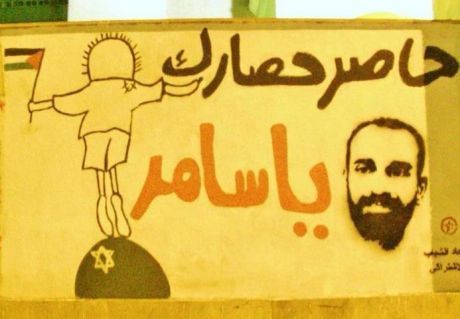News
You are here
Palestine: solidarity with Samer Issawi and political prisoners

April 23, 2013
On April 17, protests were held in several locations across the West Bank and Gaza to mark Palestinian Prisoners’ Day, an annual event intended to bring international attention to violations of the human rights of Palestinian prisoners being held in Israeli jails. This year’s protests were focused on the plight of Samer Issawi.
Issawi ends hunger strike
Issawi ended his hungerstrike after reaching an agreement with Israel that he will be released at the end of the year. In 2002, Issawi was sentenced to 30 years in prison. He was released as part of a prisoner swap for Israeli soldier Gilad Shalit in October 2011. In July 2012, he was arrested for breaching the conditions of his release. At the time, it was not specified what conditions he breached. In separate incidents, a number of the other prisoners included in the Shalit Prisoner Swap were detained as well, some without being charged.
On August 1, Issawi began a hunger strike to protest his illegal imprisonment and Israel's violation of the agreement. He survived on only water and occasional vitamin injection.
Administrative detention
Under adminstrative detention, a military court can order suspects to be detained indefinitely, subject to renewal every six months by the court, without trial or charge. According to Human Rights Watch, Article 78 of the Fourth Geneva Convention permits Israel, as the occupying power of Palestine, to legitimately detain any individual under administrative detention “for imperative reasons of security.” However, Article 78 is only meant to be invoked in exceptional circumstances.
Israeli authorities tend to use administrative detention arbitrarily to imprison, without trial, Palestinians suspected of security offenses. The refusal to afford Palestinians due process is unjust and emblematic of Israel’s occupation.
Solidarity
In an Op-Ed piece in The Guardian (3/3/13), Samer Issawi wrote: “Israel could not continue its oppression without the support of western governments. These governments...which have a historic responsibility for the tragedy of my people, should impose sanctions on the Israeli regime until it ends the occupation, recognizes Palestinian rights, and frees all Palestinian political prisoners.”
The Harper government is one of the most aggressively pro-Israel governments in the world. The plight of the Palestinians requires an international solution that begins by taking action in our own countries through boycotts and campaigns to end our own government's complicity.
If you like this article, register now for Marxism 2013: Revolution In Our Time, a weekend-long conference of ideas to change the world. Sessions include "Permanent revolution: the Arab Spring two years later", "From Cairo to Jerusalem: Palestine and the Arab Spring", and "Libya, Mali and Canadian imperialism."
Section:









